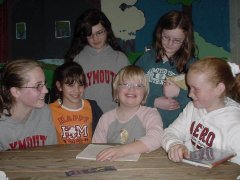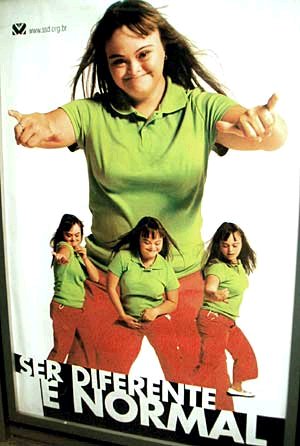Our parent support group has scheduled monthly meetings the first Friday of each month at St. Paul's Lutheran Church, 106 N. Border St., Troy, IL 62294 from 6:30 p.m. - 9:00 p.m. From 55/70, take the Troy/162 exit (#18). Go east on 162 towards Troy. Go 1.3 miles. Turn left on West Clay Street. Parking lot will be on your left.
College Scholarship for Siblings. Siblings of people with Down syndrome now have a college scholarship designed especially for them. The Alexandra H. Hauser Scholarship is available for students in the College of Liberal Arts and Sciences at the University of Illinois at Urbana-Champaign. Requirements include: a full sibling with Down syndrome, residency in Illinois, at least a sophomore standing. Preference will be given to students with a GPA of 2.5 or above on a 4.0 scale and with demonstrated financial need.
Selection priority shall be given in the following order: demonstrated service with disabled people, especially people with Down syndrome; 500 word essay on the topic of "My Relationship with My Sibling"; financial need; and GPA. The scholarship is renewable, but the recipient cannot go on academic probation while receiving it.
The award will be $1500/year, distributed as $750/sememter. For further information and for an application, please contact:
The award will be $1500/year, distributed as $750/sememter. For further information and for an application, please contact:
Joan M. Volkmann, E-mail: volkmann@uiuc.edu
Director of Development, College of Arts and Sciences
University of Illinois at Champaign-Urbana
112 English Building
608 S. Wright
Urbana, IL 61801
(877) 265-4910 [toll free]
Regional Events
May 15. 10:30 a.m. - 2:00 p.m. Down Syndrome Association of Greater St. Louis Family Picnic, Knights of Columbus Grounds, 25 Washington Street, Florissant, MO 63031. There will be many activities of the family.Registration & Breakfast: 8:00 a.m. - 9:00 a.m. Training: 9:00 a.m. - 3:30 pm. Breakfast and Lunch provided free of charge.
Location: IMPACT Center for Independent Living. 2735 East Broadway, Alton, IL 62002. For questions or to register, call Family Matters, (866) 436-7842 Ext. 107.
National Events
August 20-22, NDSC 32nd Annual Convention Boundless Horizon, Minneapolis, MN. NDSC Members: $85 Individual, $150 Family. Hyatt Regency Minneapolis (612) 370-1234, 1 (800) 233-1234, room rates: $110 + tax per night (single and double), $125 + tax per night (triple and quad).|
moonlight is the newsletter of the Riverbend Down Syndrome Association.
Editor: Victor Bishop |




